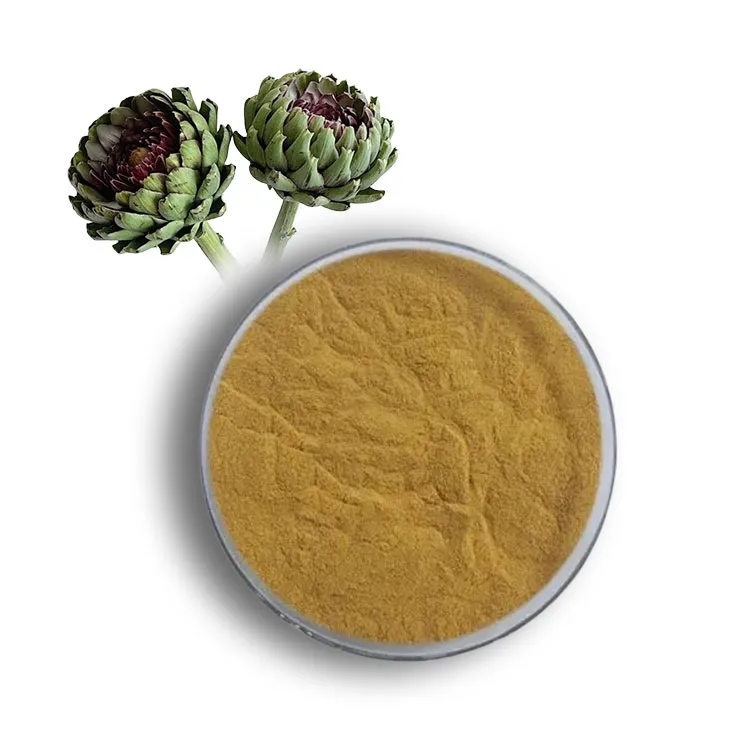- 0086-571-85302990
- sales@greenskybio.com
Is artichoke leaf extract beneficial for diabetes? Are these all safe and suitable for diabetic patients?
2024-11-13

1. Introduction
Diabetes is a chronic metabolic disorder that affects millions of people worldwide. Management of diabetes often involves lifestyle modifications, medications, and sometimes the use of natural supplements. Artichoke Leaf Extract has been the subject of interest in relation to diabetes. This article aims to explore whether Artichoke Leaf Extract is beneficial for diabetes and if it is safe for diabetic patients through in - depth analysis from multiple perspectives.

2. What is Artichoke Leaf Extract?
Artichoke (Cynara scolymus) is a plant native to the Mediterranean region. The leaves of the artichoke are rich in various bioactive compounds. Artichoke leaf extract is typically obtained through a process that involves drying and grinding the leaves, followed by extraction using solvents such as ethanol or water. The extract contains a range of substances, including:
- Cynarin: This is one of the main components in artichoke leaf extract. It has antioxidant properties and may play a role in various physiological processes.
- Chlorogenic acid: Another important compound that also has antioxidant and anti - inflammatory effects.
- Flavonoids: These are a group of plant - based compounds known for their antioxidant and potential health - promoting properties.

3. Potential Benefits for Diabetes
3.1. Blood Glucose Regulation
One of the key aspects in diabetes management is controlling blood glucose levels. There is some evidence to suggest that artichoke leaf extract may have a positive impact on blood glucose regulation. Some in - vitro and animal studies have shown that certain compounds in the extract, such as cynarin, may influence glucose metabolism. For example, it may enhance insulin sensitivity in cells. Insulin is a hormone that plays a crucial role in transporting glucose from the bloodstream into cells for energy production. By improving insulin sensitivity, artichoke leaf extract may help cells to better respond to insulin, thereby reducing blood glucose levels. However, it is important to note that human studies in this regard are still limited, and more research is needed to confirm these findings.
3.2. Antioxidant and Anti - inflammatory Effects
Diabetes is associated with increased oxidative stress and inflammation in the body. Oxidative stress occurs when there is an imbalance between the production of reactive oxygen species (ROS) and the body's antioxidant defenses. Inflammation can also contribute to the development and progression of diabetes - related complications. Artichoke leaf extract, with its rich content of antioxidants such as cynarin and chlorogenic acid, may help to counteract oxidative stress. By neutralizing ROS, the extract may protect cells from damage, including pancreatic beta - cells that are responsible for insulin production. Additionally, the anti - inflammatory properties of the extract may help to reduce chronic inflammation in the body, which could potentially have a beneficial effect on diabetes management.

4. Safety Considerations for Diabetic Patients
4.1. General Safety
Artichoke leaf extract is generally considered safe for most people when consumed in moderation. However, like any supplement, it may cause some side effects in certain individuals. Some of the common side effects reported include mild gastrointestinal symptoms such as bloating, flatulence, and abdominal discomfort. These side effects are usually mild and transient. Diabetic patients who are considering using artichoke leaf extract should be aware of these potential side effects and monitor their body's response when starting supplementation.
4.2. Interaction with Medications
One of the major concerns when using artichoke leaf extract in diabetic patients is the potential for drug - supplement interactions. Many diabetic patients are on medications to control their blood glucose levels, such as metformin, sulfonylureas, or insulin. Artichoke leaf extract may interact with these medications, either enhancing or reducing their effectiveness. For example, if the extract enhances the hypoglycemic effect of medications, it could potentially lead to dangerously low blood glucose levels (hypoglycemia). On the other hand, if it reduces the effectiveness of medications, it could result in poor blood glucose control. Therefore, it is crucial for diabetic patients to consult their healthcare provider before starting artichoke leaf extract supplementation, especially if they are on any diabetes medications.
5. Current Research Gaps
Despite the potential benefits and safety considerations discussed above, there are still significant research gaps in relation to artichoke leaf extract and diabetes. As mentioned earlier, most of the evidence regarding its effect on blood glucose regulation comes from in - vitro and animal studies. There is a lack of large - scale, well - designed human clinical trials. Without these trials, it is difficult to accurately determine the effectiveness of artichoke leaf extract in diabetic patients. Additionally, more research is needed to fully understand the long - term safety of using the extract, especially in combination with diabetes medications. Research should also focus on identifying the optimal dosage of artichoke leaf extract for diabetic patients, as this may vary depending on individual factors such as age, body weight, and the severity of diabetes.
6. Conclusion
In conclusion, artichoke leaf extract shows some potential benefits for diabetes, particularly in terms of blood glucose regulation and its antioxidant and anti - inflammatory effects. However, there are also safety considerations, especially in relation to potential side effects and interactions with diabetes medications. Given the current research gaps, more studies are needed to fully understand the role of artichoke leaf extract in diabetes management. Diabetic patients should be cautious when considering using artichoke leaf extract and should always consult their healthcare provider before starting supplementation. Only through further research can we determine whether artichoke leaf extract can be a safe and effective addition to the management of diabetes.
FAQ:
What is artichoke leaf extract?
Artichoke leaf extract is a substance derived from the leaves of the artichoke plant. It contains various bioactive compounds such as cynarin, chlorogenic acid, and flavonoids. These components are thought to have potential health - promoting effects.
How might artichoke leaf extract be beneficial for diabetes?
Some studies suggest that artichoke leaf extract may help with diabetes in several ways. The flavonoids and other compounds in it might have antioxidant properties, which can reduce oxidative stress often associated with diabetes. It may also potentially improve insulin sensitivity, helping the body use insulin more effectively. Additionally, it could play a role in regulating blood sugar levels by affecting carbohydrate metabolism.
Are there any side effects of artichoke leaf extract for diabetic patients?
While artichoke leaf extract is generally considered safe for most people when used in moderation, some diabetic patients may experience side effects. These can include mild digestive issues such as gas, bloating, or diarrhea. In rare cases, allergic reactions may occur. It's important for diabetic patients to start with a small dose and monitor their body's response.
How should diabetic patients take artichoke leaf extract?
Diabetic patients should consult their healthcare provider before taking artichoke leaf extract. If approved, they should follow the recommended dosage instructions. It can be taken in the form of supplements, usually in capsules or tablets. However, it should not be used as a substitute for prescribed diabetes medications, but rather as a complementary approach.
Can artichoke leaf extract replace diabetes medications?
No, artichoke leaf extract cannot replace diabetes medications. While it may have potential benefits for diabetes management, it has not been proven to be as effective as the medications specifically developed for diabetes treatment. Diabetic patients should always rely on their doctor - prescribed medications and use artichoke leaf extract only as an additional support if their doctor approves.
Related literature
- The Potential of Artichoke (Cynara scolymus L.) in Diabetes Mellitus Management"
- "Artichoke Leaf Extract and Its Role in Metabolic Health"
- "Beneficial Effects of Artichoke - Based Supplements in Diabetic Patients: A Review"
- ▶ Hesperidin
- ▶ Citrus Bioflavonoids
- ▶ Plant Extract
- ▶ lycopene
- ▶ Diosmin
- ▶ Grape seed extract
- ▶ Sea buckthorn Juice Powder
- ▶ Fruit Juice Powder
- ▶ Hops Extract
- ▶ Artichoke Extract
- ▶ Mushroom extract
- ▶ Astaxanthin
- ▶ Green Tea Extract
- ▶ Curcumin
- ▶ Horse Chestnut Extract
- ▶ Other Product
- ▶ Boswellia Serrata Extract
- ▶ Resveratrol
- ▶ Marigold Extract
- ▶ Grape Leaf Extract
- ▶ New Product
- ▶ Aminolevulinic acid
- ▶ Cranberry Extract
- ▶ Red Yeast Rice
- ▶ Red Wine Extract
-
Genistein
2024-11-13
-
Nettle leaf extract
2024-11-13
-
Fig Extract
2024-11-13
-
Avocado Extract Powder
2024-11-13
-
Black Rice Extract
2024-11-13
-
Yohimbine Bark Extract
2024-11-13
-
Curcuma Longa Extract/Turmeric extract
2024-11-13
-
Bilberry Extract
2024-11-13
-
Peppermint Oil
2024-11-13
-
Motherwort Extract
2024-11-13





















